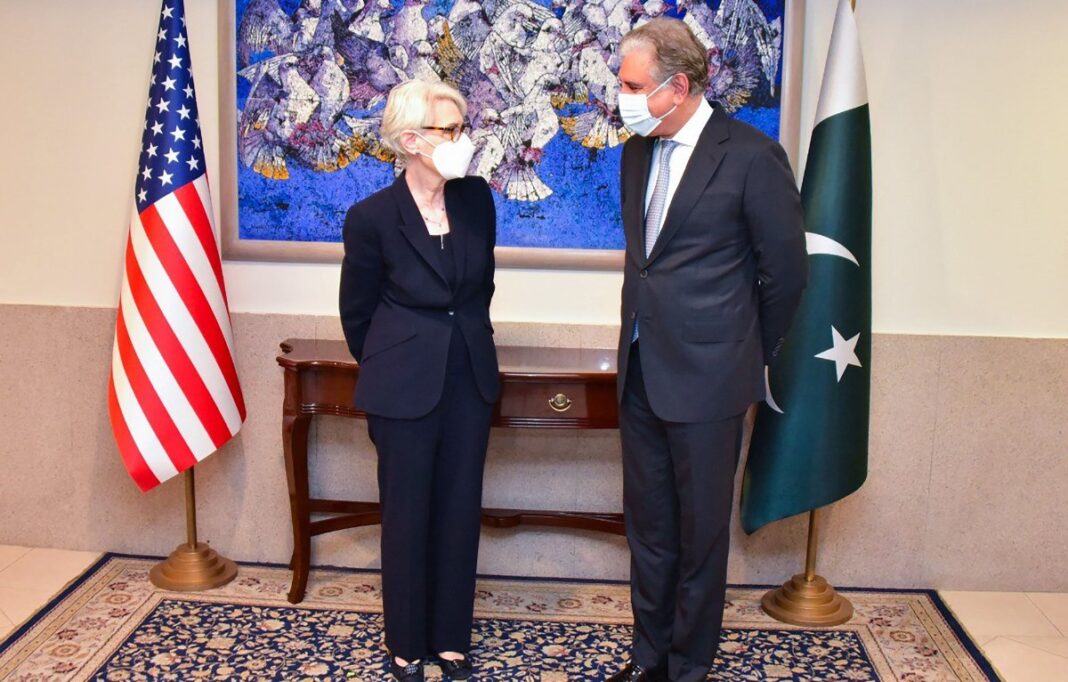ISLAMABAD: Several former foreign secretaries of Pakistan have described this week’s visit of US Deputy Secretary of State Wendy Sherman to Islamabad as a “positive development,” but independent experts said they were skeptical about the future of Pakistan-US ties.
Media and experts say meetings between Pakistani officials and Sherman in Islamabad were “strained” amid a worsening relationship between the two countries, as each searches for a way forward in a Taliban-ruled Afghanistan.
Sherman’s visit comes as Republican senators press for legislation back home sanctioning Pakistan for providing safety for the Taliban, something Islamabad denies.
The move has raised hackles among Pakistan’s leaders, who have slammed Washington for what they say is the unjust blaming of Pakistan for America’s losses in Afghanistan — especially after seeking and receiving Islamabad’s help in the protracted peace talks with the Taliban.
Sherman also came to Pakistan straight from a visit to its arch-foe India, where she told a gathering the US did not see itself building a “broad relationship” with Islamabad. But former Pakistani diplomats cautioned against reading too much into the “negativity,” saying the visit was a “positive development” on balance.
“It is a good and positive development that a high ranking official from the US government has visited Pakistan, as Islamabad has always maintained that both countries need to stay engaged and continue to work together,” Aizaz Ahmed Chaudhary, the former foreign secretary who also served as Pakistan’s envoy to the US, told Arab News on Friday.
“I don’t think we should read much into it (Sherman’s statement in India),” Chaudhry added. “For us what matters is her visit to Islamabad. Pakistan is engaged with the US and engaged for the right reason. It is important that both countries keep working to bring lasting peace and stability in Afghanistan.”
Another former foreign secretary, Tehmina Janjua, agreed.
“Despite recent statements by US officials, Pakistan should remain focused on having good and positive relations with Washington,” she said, adding that Pakistan’s main goal should be to establish a relationship based on “strategic conversations” on a large number of issues.
“We need to have strategic dialogue,” she said, “and a relationship independent of Afghanistan.”
After Sherman’s meeting with Pakistani Foreign Minister Shah Mahmood Qureshi, his office said he had told the visiting dignitary that Islamabad sought a “broad-based, long-term and lasting relationship” with the US based on economic cooperation and the mutual promotion of peace in the region.
In a separate statement released after a meeting with Sherman, the Pakistani army chief also called for a “multi-domain” relationship.
But independent analysts were skeptical this was possible in the near future.
Ayesha Siddiqa, author and geo-political scholar, told Arab News that Pakistan was now “fundamentally marginal in American strategic plans,” which had shifted in favor of India.
Political analyst and columnist Musharraf Zaidi said Pakistan should now “expect the worst” from the US.
“With the approach of a comprehensive embrace of India, the US has decided that it is not really interested in better relations with Pakistan,” Zaidi said, calling Pakistan an “ideal scapegoat” for Washington for its failures in Afghanistan.
“Washington is giving a cold shoulder to Islamabad because it seeks to deflect responsibility for the fiasco in Afghanistan, away from the decisions it made itself, and towards a party (Pakistan) that serves as a credible escape for its failure in Afghanistan.”




